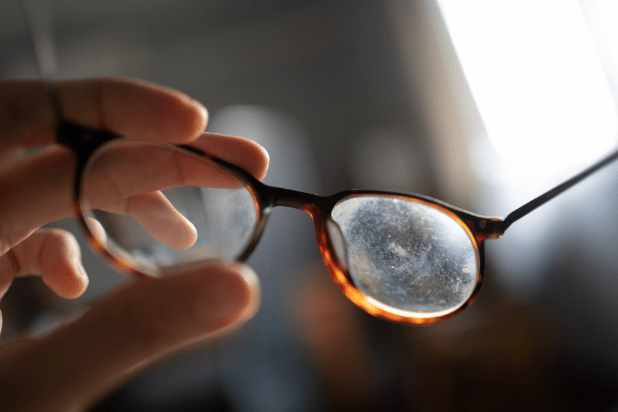How to prevent eyeglasses from fogging up?

Eyeglasses are designed to help you see more clearly, but certain situations can cause them to make your vision even worse than your uncorrected vision. Temperature shifts, humid environments, or even a mask or scarf could cause condensation on the surface of your eyeglass lenses. When glasses fog up, it can be an inconvenience, annoyance, or even a major hazard. Condensation or fogging your lenses is a common problem, but there are tricks you can use to limit how much it interferes with your eyesight.
Understanding the Problem: Why do glasses fog up?
Condensation, or fog, happens when moisture accumulates and binds together on a hard surface. You will see this happening above a boiling pot of water, on your bathroom mirror after a hot shower, or on your windows or doors when it’s colder outside than inside your house. When these kinds of surfaces fog up, you might be able to ignore them, but when condensation forms on the surface of your eyeglasses, it can cloud and obstruct your vision.
Eyeglasses usually become fogged up in a humid area or when you move between hot and cold environments. The COVID-19 pandemic added another increasingly common issue—glasses fogging while wearing makeup or facial covering. Especially when masking was mandatory in public places, foggy eyeglasses became something of a norm in the COVID era. Glasses fog up with mask-wearing because of the air that escapes around your nose's bridge and the mask's edges. Even when there isn’t a significant change in the temperature around you, the moisture and heat build from your breath in the mask. And even on a warm day, your body temperature—and the temperature of your breath— is bound to be higher than the ambient temperature around you and the surface temperature of your eyeglasses.
How to deal with foggy glasses immediately?
When your glasses fog up, it’s an instant problem that usually requires an instant solution. Condensation can completely block your sight—a dangerous problem when you are doing certain tasks like driving a car.
Tip 1: Wipe your lenses
Wiping the condensation off your lenses is the quickest and easiest way to clear moisture from your glasses. Be careful because not every material is suitable for wiping your lenses. Abrasive fabrics or materials with residue on them can damage or coat your lenses and cause other clarity problems. The safety of this solution also depends on what you are doing when your glasses fog up. If both your hands are busy—like when you are driving a car—it can be difficult and dangerous to use one or both hands to remove your glasses, wipe them, and put them back on. Keep in mind that you won’t be able to see clearly while you are wiping your glasses. Finally, even if you wipe your lenses clear, continuing in the same humid environment or continuing to wear a face mask can cause condensation to build up again quickly.
Tip 2: Adjust your glasses
If you can’t completely remove your glasses to wipe away condensation, or they continue to fog up after wiping, you can try repositioning them up and down the bridge of your nose. Allowing more air to circulate between your warm face and the cool air around you may help, but you may also need to adjust the nose pads, arms of your frames, or parts of your face mask to keep condensation from building again quickly.
Prevention tips for foggy glasses

Methods for clearing condensation from fogged-up lenses are pretty straightforward but have limitations. There are more options when it comes to things you can do to help prevent your glasses from fogging up in the first place.
Tip 1: Wash your glasses
Certain coatings or residue on your lenses can actually make them fog up more easily. But cleaning your lenses—especially by washing them with simple soap and water—can help. The soap, in particular, leaves a slippery coating on the lenses that can help prevent condensation from forming.
Tip 2: Include premium coatings on you lenses
At Overnight Glasses we include all premium coatings on your new glasses. These are very beneficial and dramatically improve your visual performance while extending the longevity of your lenses. Superhydrophobic, oleophobic, and anti-static coatings are like a superhero team for your glasses, each bringing a special power to keep your vision clear and fog-free. Let's start with superhydrophobic coatings: these are amazing at repelling water. Imagine a tiny droplet of water trying to cling to your glasses, only to be repelled as if by a force field. This means that moisture from your breath or the environment doesn't stand a chance to form that annoying fog on your lenses. It’s like having an invisible shield that keeps the water droplets at bay, ensuring your lenses stay clear no matter the weather or your activities.
Then, there's the oleophobic coating, which is all about keeping oily smudges away. This is especially helpful because our fingers are often greasy, and every time we touch our glasses, we risk smudging them. With an oleophobic coating, oils and fingerprints are much less likely to stick, keeping your lenses clearer for longer. And let’s not forget the anti-static part of this trio. Static electricity can attract dust and other tiny particles to your lenses, but an anti-static coating says 'no way' to this. It reduces the static charge, meaning less dust and dirt accumulation. In short, these coatings work together brilliantly to ensure your glasses are not only fog-free but also cleaner and clearer, giving you the best possible vision in all conditions. If you have an existing pair of frames and want new lenses, or want to select a new pair of glasses with a different lens type, Overnight Glasses offers quick-turnaround and affordable solutions.
Tip 3: Apply shaving cream and rinse
Similar to soap, shaving cream will leave a coating on your lenses that will make it more difficult for moisture to collect and bind together on your glasses. Just wipe shaving cream on either side of the lens and rinse off before wearing. Other substances like gentle shampoos and toothpaste may have a similar effect, just make sure your toothpaste doesn’t include any abrasive materials like baking soda that could scratch the surface of your lenses.
Tip 4: Anti-fog products
Anti-fog pre-moistened wipes and sprays are another option since it’s not always convenient to carry soap and shaving cream around with you. These sprays became pretty easy to find during the COVID pandemic when widespread mask-wearing kept lenses fogged up. You can still find them in some stores, but you might have to order these products online or get them from your optometrist—and they will probably cost more than some simpler solutions.
Tip 5: Mask-specific tricks
If you don’t normally have a problem with your glasses fogging up but you find yourself needing to wear a mask that creates extra condensation, there are other options. Nose bridges, a tissue tucked under the bridge of the mask, and adhesives or other seals that help secure your mask with a tight fit can all help reduce fogging.
The best way to clean the glasses
Whether you have taken steps to prevent fogging or not, cleaning your glasses is an important part of keeping your vision clear. When cleaning off oils, smudges, or condensation, be sure to only use cleaning products that are appropriate for your lens material and soft cloths that won’t leave behind fibers or scratches on your lenses. Abrasive cleaners and materials may do a good job cleaning your lenses, but they will also create tiny scratches and abrasions that can reduce the clarity of your lens.
Conclusion
Foggy lenses are a problem just about every eyeglass-wearer has encountered at some point. There are treatments you can use to reduce fogging, and your lens type also plays a role in how easily condensation forms. If your glasses have become scratched or damaged from frequent wiping, or you are looking to replace your glasses with a more fog-free material, Overnight Glasses can help. Plastic and polycarbonate lenses or additional coatings can be added to your eyeglasses to help limit the chances your vision will become blocked with condensation.
